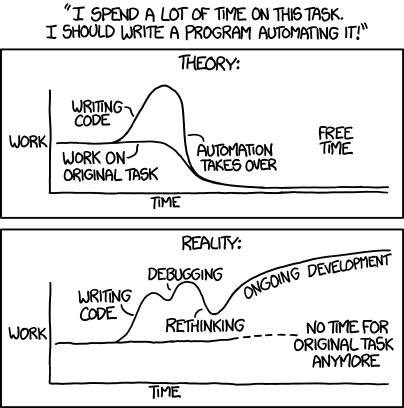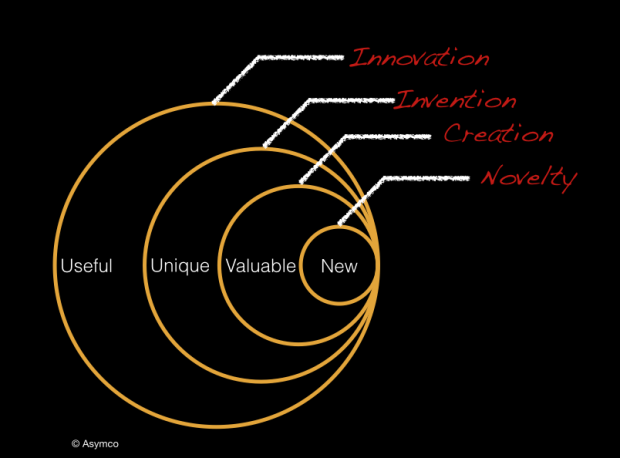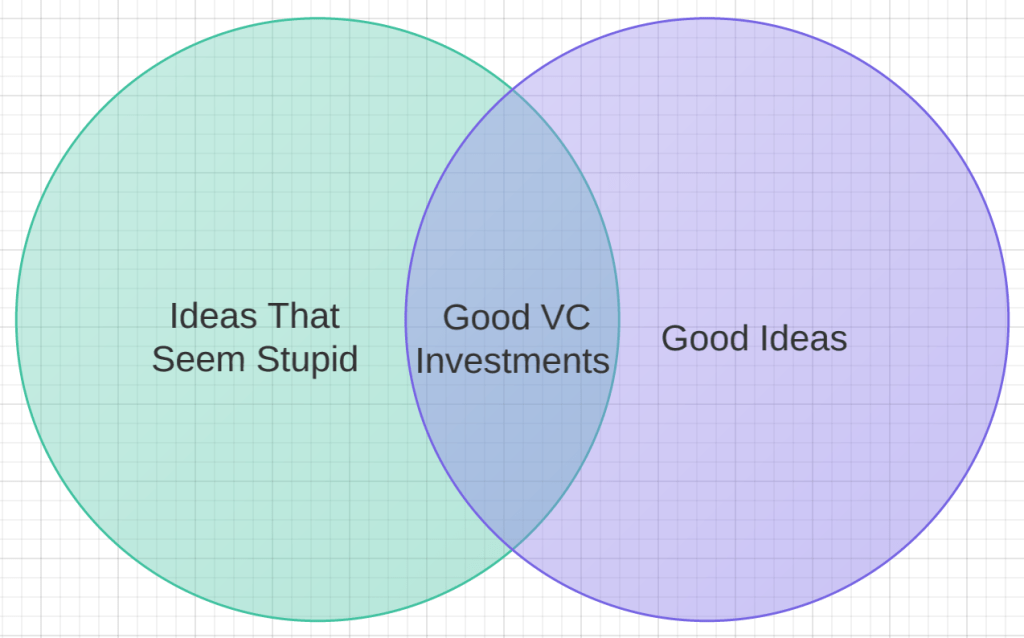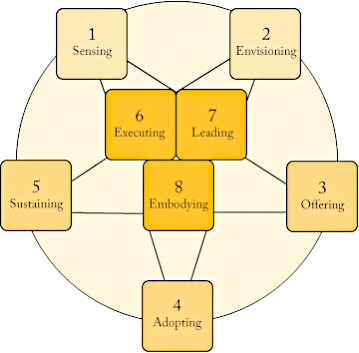Innovation is about finding a better way of doing something. Like many of the new development buzzwords (which many of them are over-used on many business documents), the concept of innovation originates from the world of business. It refers to the generation of new products through the process of creative entrepreneurship, putting it into production, and diffusing it more widely through increased sales. Innovation can be viewed as t he application of better solutions that meet new requirements, in-articulated needs, or existing market needs. This is accomplished through more effective products, processes, services, technologies, or ideas that are readily available to markets, governments and society. The term innovation can be defined as something original and, as a consequence, new, that “breaks into” the market or society.
Innoveracy: Misunderstanding Innovation article points out that there is a form of ignorance which seems to be universal: the inability to understand the concept and role of innovation. The way this is exhibited is in the misuse of the term and the inability to discern the difference between novelty, creation, invention and innovation. The result is a failure to understand the causes of success and failure in business and hence the conditions that lead to economic growth. The definition of innovation is easy to find but it seems to be hard to understand. Here is a simple taxonomy of related activities that put innovation in context:
- Novelty: Something new
- Creation: Something new and valuable
- Invention: Something new, having potential value through utility
- Innovation: Something new and uniquely useful
The taxonomy is illustrated with the following diagram.
The differences are also evident in the mechanisms that exist to protect the works: Novelties are usually not protectable, Creations are protected by copyright or trademark, Inventions can be protected for a limited time through patents (or kept secret) and Innovations can be protected through market competition but are not defensible through legal means.
Innovation is a lot of talked about nowdays as essential to businesses to do. Is innovation essential for development work? article tells that innovation has become central to the way development organisations go about their work. In November 2011, Bill Gates told the G20 that innovation was the key to development. Donors increasingly stress innovation as a key condition for funding, and many civil society organisations emphasise that innovation is central to the work they do.
Some innovation ideas are pretty simple, and some are much more complicated and even sound crazy when heard first. The is place for crazy sounding ideas: venture capitalists are gravely concerned that the tech startups they’re investing in just aren’t crazy enough:
Not all development problems require new solutions, sometimes you just need to use old things in a slightly new way. Development innovations may involve devising technology (such as a nanotech water treatment kit), creating a new approach (such as microfinance), finding a better way of delivering public services (such as one-stop egovernment service centres), identifying ways of working with communities (such as participation), or generating a management technique (such as organisation learning).
Theorists of innovation identify innovation itself as a brief moment of creativity, to be followed by the main routine work of producing and selling the innovation. When it comes to development, things are more complicated. Innovation needs to be viewed as tool, not master. Innovation is a process, not a one time event. Genuine innovation is valuable but rare.
There are many views on the innovation and innvation process. I try to collect together there some views I have found on-line. Hopefully they help you more than confuze. Managing complexity and reducing risk article has this drawing which I think pretty well describes innovation as done in product development:
8 essential practices of successful innovation from The Innovator’s Way shows essential practices in innovation process. Those practices are all integrated into a non-sequential, coherent whole and style in the person of the innovator.
In the IT work there is lots of work where a little thinking can be a source of innovation. Automating IT processes can be a huge time saver or it can fail depending on situation. XKCD comic strip Automation as illustrates this:

System integration is a critical element in project design article has an interesting project cost influence graphic. The recommendation is to involve a system integrator early in project design to help ensure high-quality projects that satisfy project requirements. Of course this article tries to market system integration services, but has also valid points to consider.
Core Contributor Loop (CTTDC) from Art Journal blog posting Blog Is The New Black tries to link inventing an idea to theory of entrepreneurship. It is essential to tune the engine by making improvements in product, marketing, code, design and operations.






5,702 Comments
Tomi Engdahl says:
50 years since the first flight of the General Dynamics F-16 Fighting Falcon, one of the most successful fighter aircraft in history. Serving with 25 nations’ air forces, it is still being produced after almost 5000 built.
https://www.popularmechanics.com/military/aviation/a46490676/f-16-fighting-falcon-50-years-of-air-combat/?fbclid=IwAR2IWpq5NsXcf_yp1hvcYGKrVKAsfawKrWoztacnVIFVWa2MGoH0RgJ0FaM
The F-16 Fighting Falcon Just Turned 50. Here Are 6 Key Moments From Its Storied Combat Record
While the F-16 will gradually phase out of U.S. Air Force service, some of its greatest victories may still lie ahead
Tomi Engdahl says:
https://hackaday.com/2024/01/30/the-worlds-first-microprocessor-f-14-central-air-data-computer/
Tomi Engdahl says:
https://historianet.fi/kulttuuri/taide/keta-mona-lisa-esittaa
Tomi Engdahl says:
https://etn.fi/index.php/13-news/15803-tekoaely-loeysi-litiumille-korvaajan-viikossa
Tomi Engdahl says:
A new material creates clean electricity from the air around it
The physics at play in a storm cloud, but in a thin, hole-filled film.
https://www.popsci.com/technology/air-gen-electricity-film/
Tomi Engdahl says:
AI Discovers New Material That Could Slash Lithium Use In Batteries
Great job, AI! Please don’t kill us.
https://www.iflscience.com/ai-discovers-new-material-that-could-slash-lithium-use-in-batteries-72652
https://arxiv.org/abs/2401.04070
Tomi Engdahl says:
https://www.theguardian.com/world/2024/jan/25/indias-courts-to-rule-on-who-invented-butter-chicken
Tomi Engdahl says:
https://www.mdpi.com/1996-1073/14/4/990?utm_campaign=journnews_ccbj_energies&utm_medium=social_journ&utm_source=facebook
Tomi Engdahl says:
https://phys.org/news/2024-01-quantum-ping-pong-atoms-photon.html#google_vignette
Tomi Engdahl says:
Researchers Claim First Functioning Graphene-Based Chip The semiconductor bests silicon alternatives for electron mobility
https://spectrum.ieee.org/graphene-semiconductor
Researchers at Georgia Tech, in Atlanta, have developed what they are calling the world’s first functioning graphene-based semiconductor. This breakthrough holds the promise to revolutionize the landscape of electronics, enabling faster traditional computers and offering a new material for future quantum computers.
The research, published on 3 January in Nature and led by Walt de Heer, a professor of physics at Georgia Tech, focuses on leveraging epitaxial graphene, a crystal structure of carbon chemically bonded to silicon carbide (SiC). This novel semiconducting material, dubbed semiconducting epitaxial graphene (SEC)—or alternatively, epigraphene—boasts enhanced electron mobility compared with that of traditional silicon, allowing electrons to traverse with significantly less resistance. The outcome is transistors capable of operating at terahertz frequencies, offering speeds 10 times as fast as that of the silicon-based transistors used in current chips.
Tomi Engdahl says:
https://www.sciencealert.com/weve-been-misreading-a-major-law-of-physics-for-the-last-300-years
Tomi Engdahl says:
https://arstechnica.com/gadgets/2024/01/inventor-of-ntp-protocol-that-keeps-time-on-billions-of-devices-dies-at-age-85/
Tomi Engdahl says:
https://inspiringdesigns.net/giant-floor-is-lava-rugs/#google_vignette
Tomi Engdahl says:
https://www.hackster.io/news/marb-s-lab-builds-an-arduino-compatible-molecular-switch-flipped-with-laser-beams-203c863a03ce
Tomi Engdahl says:
https://www.helsinki.fi/fi/uutiset/ihmisten-teknologia/tuskin-piilaaksossa-1990-luvulla-nahtiin-mita-tulossa-digikonsernien-valta-koettelee-koko-poliittista-jarjestelmaa?utm_source=twitter&utm_medium=social_owned&fbclid=IwAR0eMpCDaXqDFLJ25ecUP2K5gcC3SbY29t4SxeYSHSXzA7B0CmXJDQrWN_Q_aem_AVJ-DjIdXRvnTi1xjIuTET8IJzWzD3I1zu_8hGukbdElEtHelY00_wP5KCt3jgkVpHxpig_A6oMDtZFUOZPMHwWv
Tomi Engdahl says:
Chemists Have Just Tied The Tightest Knot Ever, Made of Just 54 Atoms
https://www.sciencealert.com/chemists-have-just-tied-the-tightest-knot-ever-made-of-just-54-atoms
Tomi Engdahl says:
https://phys.org/news/2024-01-hafnia-paves-generation-memory-devices.html#google_vignette
Tomi Engdahl says:
https://muropaketti.com/tietotekniikka/tietotekniikkauutiset/tutkijat-kehittivat-maailman-ensimmaisen-grafeenipiirin-voi-johtaa-terahertsin-suorittimiin/
Tomi Engdahl says:
Sound-powered sensors stand to save millions of batteries
https://techxplore.com/news/2024-01-powered-sensors-millions-batteries.html
Tomi Engdahl says:
https://www.engadget.com/the-first-ev-with-a-lithium-free-sodium-battery-hits-the-road-in-january-214828536.html
Tomi Engdahl says:
Scientists Film Plant ‘Talking’ to Its Neighbor, And The Footage Is Incredible
https://www.sciencealert.com/scientists-film-plant-talking-to-its-neighbor-and-the-footage-is-incredible
Tomi Engdahl says:
https://www.tomshardware.com/pc-components/power-supplies/chinese-developed-nuclear-battery-has-a-50-year-lifespan
Tomi Engdahl says:
Elon Musk’s Neuralink implants brain tech in human patient for the first time
https://www.cnbc.com/2024/01/29/elon-musks-neuralink-implants-brain-tech-in-human-patient-for-the-first-time.html
Tomi Engdahl says:
The New, New Transistor In power electronics, aluminum nitride could overtake two powerhouses that only recently bested silicon
https://spectrum.ieee.org/aluminum-nitride
Tomi Engdahl says:
The rise and fall of the standard user interface
IBM’s SAA and CUA brought harmony to software design… until everyone forgot
https://www.theregister.com/2024/01/24/rise_and_fall_of_cua/
Tomi Engdahl says:
Scientists Transformed Pure Water Into a Metal – And There’s Video
https://www.sciencealert.com/scientists-transformed-pure-water-into-a-metal-and-theres-video
Pure water is an almost perfect insulator.
Yes, water found in nature conducts electricity – but that’s because of the impurities therein, which dissolve into free ions that allow an electric current to flow. Pure water only becomes “metallic” – electronically conductive – at extremely high pressures, beyond our current abilities to produce in a lab.
But, as researchers demonstrated for the first time back in 2021, it’s not only high pressures that can induce this metallicity in pure water.
By bringing pure water into contact with an electron-sharing alkali metal – in this case an alloy of sodium and potassium – free-moving charged particles can be added, turning water metallic.
The resulting conductivity only lasts a few seconds
Tomi Engdahl says:
Researchers design a processor from DNA — microfluidic chip completes math calculations and also stores data in DNA
News
By Christopher Harper published 1 day ago
DNA learns to do math.
https://www.tomshardware.com/pc-components/storage/researchers-design-cpu-from-microfluidic-dna-processor-completes-math-calculations-and-also-stores-data-in-dna
Tomi Engdahl says:
https://hackaday.com/2024/01/12/the-early-history-of-the-microcontroller-it-came-from-texas/
Tomi Engdahl says:
https://hackaday.com/2024/01/12/decoding-a-rom-from-a-picture-of-the-chip/
Tomi Engdahl says:
https://hackaday.com/2024/01/16/check-out-this-pdp-11-running-unix-with-a-teletype-terminal/
Tomi Engdahl says:
https://en.wikipedia.org/wiki/Nanoscale_vacuum-channel_transistor
Vacuum Tunneling Transistor with Nano Vacuum Chamber for Harsh Environments
https://pubs.acs.org/doi/10.1021/acsnano.3c02916
Tomi Engdahl says:
An enzyme used in laundry detergent can recycle single-use plastics within 24 hours
https://phys.org/news/2024-01-enzyme-laundry-detergent-recycle-plastics.html#google_vignette
Scientists at King’s College London have developed an innovative solution for recycling single-use bioplastics commonly used in disposable items such as coffee cups and food containers.
The novel method of chemical recycling, published in Cell Reports Physical Science, uses enzymes typically found in biological laundry detergents to “depolymerize”—or break down—landfill-bound bioplastics. Rapidly converting the items into soluble fragments within just 24 hours, the process achieves full degradation of the bioplastic polylactic acid (PLA). The approach is 84 times faster than the 12-week-long industrial composting process used for recycling bioplastic materials.
This discovery offers a widespread recycling solution for single-use PLA plastics, as the team of chemists at King’s found that in a further 24 hours at a temperature of 90°C, the bioplastics break down into their chemical building blocks. Once converted into monomers—single molecules—the materials can be turned into equally high-quality plastic for multiple reuse.
The problem with ‘green’ plastics
Current rates of plastic production outstrip our ability to dispose of it sustainably. According to Environmental Action, it is estimated that in 2023 alone more than 68 million tons of plastic globally ended up in natural environments due to the imbalance between the huge volumes of plastics produced and our current capacity to manage and recycle plastic at the end of its life. A recent OECD report predicted that the amount of plastic waste produced worldwide is on track to almost triple by 2060, with around half ending up in landfill and less than a fifth recycled.
Tomi Engdahl says:
Shining Laser Light on Glass Creates a Solar Cell New energy and sensor applications could await
https://spectrum.ieee.org/next-generation-solar-transparent-glass
Tomi Engdahl says:
“Second sound is the hallmark of superfluidity”
For the first time, MIT scientists have successfully imaged how heat actually travels in a wave, known as a “second sound,”
Scientists Confirm the Incredible Existence of ‘Second Sound’
Here’s visible proof for the first time ever.
https://www.popularmechanics.com/science/a46756715/second-wave-superfluid/?fbclid=IwAR1H_6fXL6DZ8V1g8XZGWktBp3KL90o0DVQImu26ktqlvtL5FqtFoM4O_Do
Tomi Engdahl says:
You Could Be Relatively Cooler In Diamond-Coated Clothing
https://hackaday.com/2024/02/15/you-could-be-relatively-cooler-in-diamond-coated-clothing/
Tomi Engdahl says:
https://www.uusiteknologia.fi/2024/02/16/tutkijoille-lapimurto-yksisuuntainen-lasi-tehostaisi-aurinkokennojen-toimintaa/
Tomi Engdahl says:
https://www.tomshardware.com/pc-components/cpus/intel-discloses-34-security-holes-in-firmware-and-software-thunderbolt-xtu-chipset-drivers-and-more
Tomi Engdahl says:
Cancer breakthrough as doctors celebrate new ‘wonder drug’
The new drug cuts of the tumour’s food supply and could be used to treat mesothelioma
https://www.independent.co.uk/news/health/mesothelioma-tumour-cancer-drug-treatment-b2497227.html
Tomi Engdahl says:
Scientists Confirm the Incredible Existence of ‘Second Sound’
Here’s visible proof for the first time ever.
https://www.popularmechanics.com/science/a46756715/second-wave-superfluid/
Tomi Engdahl says:
New thermometry method reveals that compressing a gas may lead to cooling
https://phys.org/news/2024-02-thermometry-method-reveals-compressing-gas.html
An international research team from Innsbruck and Geneva has developed a new thermometry method to measure temperatures for low-dimensional quantum gases. With this method it was found that compressing a gas may lead to cooling. The results on this counterintuitive phenomenon have just been published in Science Advances.
Tomi Engdahl says:
Earth Has Received Power Beamed From A Satellite In Space For The First Time
The experimental system could be used to send energy anywhere on Earth.
https://www.iflscience.com/earth-has-received-power-beamed-from-a-satellite-in-space-for-the-first-time-72957
Tomi Engdahl says:
Researchers solve a foundational problem in transmitting quantum information
https://phys.org/news/2024-02-foundational-problem-transmitting-quantum.html
Tomi Engdahl says:
‘Universal memory’ breakthrough brings the next generation of computers 1 step closer to major speed boost
News
By Keumars Afifi-Sabet published February 09, 2024
Universal memory promises to replace both RAM and flash storage in computers with a better, faster and more energy-efficient alternative — and researchers have just moved this one step closer to reality.
https://www.livescience.com/technology/electronics/universal-memory-breakthrough-replaces-ram-flash-next-generation-of-computers-major-speed-boost
Tomi Engdahl says:
https://supercarblondie.com/amelia-earhart-plane-found/
Tomi Engdahl says:
Research team takes a fundamental step toward a functioning quantum internet
https://phys.org/news/2024-02-team-fundamental-functioning-quantum-internet.html#google_vignette
Tomi Engdahl says:
Logo
moonsun
Subscribe
‘Little ghosts’: Scientists expose hidden solid-state battery killer
During charging, lithium filaments can grow, forming a “wire” connecting electrodes. This halts ion flow and directs all electrons internally.
https://interestingengineering.com/innovation/scientists-expose-battery-killer
Tomi Engdahl says:
https://hackaday.com/2024/02/07/metal-crystal-stops-electrons/
Tomi Engdahl says:
Forgetting the history of Unix is coding us into a corner
The lessons of yesteryear’s OS are getting lost in translation
https://www.theregister.com/2024/02/16/what_is_unix/
FOSDEM 2024 There are vital lessons to be learned from the history of Unix, but they’re being forgotten. This is leading to truly vast amounts of wasted effort.
Tomi Engdahl says:
Uusi magnetismin muoto löytyi nenän edestä – Laajat vaikutukset teknologiaan ja tutkimukseen
Altermagneettejen olemassaolo on vahvistettu.
https://www.tekniikkatalous.fi/uutiset/uusi-magnetismin-muoto-loytyi-nenan-edesta-laajat-vaikutukset-teknologiaan-ja-tutkimukseen/e1611eab-27e7-4318-8227-05d348a0b78e
Magneettien perhe on saanut lisäystä, kun tutkijat ovat kokeiden jälkeen pystyneet todistamaan niin kutsutun altermagnetismin olemassaolon. Löydös on julkaistu arvostetussa Nature-lehdessä
Vuonna 2019 tutkijat ennustivat kolmannen permanentin magnetismityypin olemassaolon. Altermagneetit näyttäisivät antiferromagneeteilta, mutta spinien levyt näyttäisivät samalta, mistä tahansa kulmasta katsottuna.
Altermagnetism: New form of magnetism discovered in common materials
https://newatlas.com/science/altermagnetism-new-form-magnetism-discovered/
The most familiar form of magnetism – the kind that keeps your kids’ terrible artworks pinned to your fridge – is what’s called ferromagnetism. The effect is produced when the spins of the electrons in the material all spin in the same direction. Another major branch is known as antiferromagnetism, which arises when electron spins alternate direction from their neighbors. Other forms include diamagnetism, paramagnetism and ferrimagnetism, which are all born from different mechanisms.
But now, a brand new form of magnetism has been discovered. It’s been dubbed altermagnetism, and it features a weird mix of properties from other types of the phenomenon – its electrons spin in alternating directions, like antiferromagnets, which means it doesn’t produce magnetization. But the material’s energy bands also have alternating spins from neighboring bands.
Altermagnetism was first predicted in 2019, but has now been confirmed in experiments at the Swiss Light Source (SLS) synchrotron.
Tomi Engdahl says:
https://www.tomshardware.com/tech-industry/cyber-security/your-fingerprints-can-be-recreated-from-the-sounds-made-when-you-swipe-on-a-touchscreen-researchers-new-side-channel-attack-can-reproduce-partial-fingerprints-to-enable-attacks